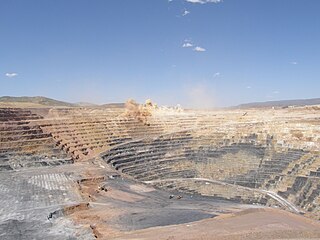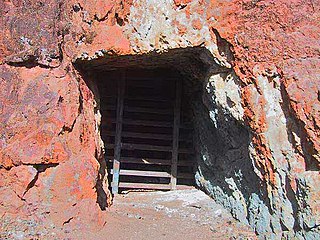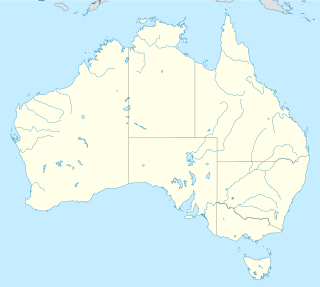
A land mine is an explosive device concealed under or on the ground and designed to destroy or disable enemy targets, ranging from combatants to vehicles and tanks, as they pass over or near it. Such a device is typically detonated automatically by way of pressure when a target steps on it or drives over it, although other detonation mechanisms are also sometimes used. A land mine may cause damage by direct blast effect, by fragments that are thrown by the blast, or by both.

Mining is the extraction of valuable minerals or other geological materials from the Earth, usually from an ore body, lode, vein, seam, reef, or placer deposit. These deposits form a mineralized commodity that is of economic interest to the miner.

A naval mine is a self-contained explosive device placed in water to damage or destroy surface ships or submarines. Unlike depth charges, mines are deposited and left to wait until they are triggered by the approach of, or contact with, any vessel. Naval mines can be used offensively, to hamper enemy shipping movements or lock vessels into a harbour; or defensively, to protect friendly vessels and create "safe" zones. Mines allow the minelaying force commander to concentrate warships or defensive assets in mine-free areas giving the adversary three choices: undertake an expensive and time-consuming minesweeping effort, accept the casualties of challenging the minefield, or use the unmined waters where the greatest concentration of enemy firepower will be encountered.

Lapis lazuli, or lapis for short, is a deep-blue metamorphic rock used as a semi-precious stone that has been prized since antiquity for its intense color.

Turquoise is an opaque, blue-to-green mineral that is a hydrated phosphate of copper and aluminium, with the chemical formula CuAl6(PO4)4(OH)8·4H2O. It is rare and valuable in finer grades and has been prized as a gemstone and ornamental stone for thousands of years owing to its unique hue. Like most other opaque gems, turquoise has been devalued by the introduction onto the market of treatments, imitations and synthetics.

Potash includes various mined and manufactured salts that contain potassium in water-soluble form. The name derives from pot ash, which refers to plant ashes or wood ash soaked in water in a pot, which was the primary means of manufacturing the product before the Industrial Era. The word "potassium" is derived from "potash".

Coal mining is the process of extracting coal from the ground. Coal is valued for its energy content and since the 1880s has been widely used to generate electricity. Steel and cement industries use coal as a fuel for extraction of iron from iron ore and for cement production. In the United Kingdom and South Africa, a coal mine and its structures are a colliery, a coal mine is called a 'pit', and the above-ground structures are a 'pit head'. In Australia, "colliery" generally refers to an underground coal mine.

Open-pit mining, also known as mega-mining, open-cast or open cut mining, is a surface mining technique of extracting rock or minerals from the earth by their removal from an open-air pit, sometimes known as a borrow.

A minesweeper is a small warship designed to remove or detonate naval mines. Using various mechanisms intended to counter the threat posed by naval mines, minesweepers keep waterways clear for safe shipping.

A miner is a person who extracts ore, coal, chalk, clay, or other minerals from the earth through mining. There are two senses in which the term is used. In its narrowest sense, a miner is someone who works at the rock face; cutting, blasting, or otherwise working and removing the rock. In a broader sense, a "miner" is anyone working within a mine, not just a worker at the rock face.

An adit is an entrance to an underground mine which is horizontal or nearly horizontal, by which the mine can be entered, drained of water, ventilated, and minerals extracted at the lowest convenient level. Adits are also used to explore for mineral veins.

Zonguldak Province is a province along the western Black Sea coast region of Turkey. The province is 3.481 km2 in size and has a population of 619,703. Its adjacent provinces are Düzce to the southwest, Bolu to the south, Karabük to the southeast, and Bartın to the east. The capital is Zonguldak. Its Governor is Erdoğan Bektaş.
The Gold Country is a historic region in the northern portion of the U.S. state of California, that is primarily on the western slope of the Sierra Nevada. It is famed for the mineral deposits and gold mines that attracted waves of immigrants, known as the 49ers, during the 1849 California Gold Rush.
The Pilbara is a large, dry, thinly populated region in the north of Western Australia. It is known for its Aboriginal peoples; its ancient landscapes; the red earth; and its vast mineral deposits, in particular iron ore. It is also a global biodiversity hotspot for subterranean fauna.

Gold mining is the extraction of gold resources by mining.
A limpet mine is a type of naval mine attached to a target by magnets. It is so named because of its superficial similarity to the shape of the limpet, a type of sea snail that clings tightly to rocks or other hard surfaces.

The Lake Vermilion-Soudan Underground Mine State Park is a Minnesota state park at the site of the Soudan Underground Mine, on the south shore of Lake Vermilion, in the Vermilion Range (Minnesota). The mine is known as Minnesota's oldest, deepest, and richest iron mine, and now hosts the Soudan Underground Laboratory. As the Soudan Iron Mine, it has been designated a U.S. National Historic Landmark.

The Gambian pouched rat, also known commonly as the African giant pouched rat, is a species of nocturnal pouched rat of the giant pouched rat genus Cricetomys, in the family Nesomyidae. The species is among the largest muroids in the world, growing up to about 0.9 metres (3 ft) long including the tail which makes up half of its total length. It is widespread in Sub-Saharan Africa, ranging geographically from Senegal to Kenya and from Angola to Mozambique and in altitude from sea level to 2,000 metres (6,600 ft).

Minesweeper is a single-player puzzle video game. The objective of the game is to clear a rectangular board containing hidden "mines" or bombs without detonating any of them, with help from clues about the number of neighboring mines in each field. The game originates from the 1960s, and it has been written for many computing platforms in use today. It has many variations and offshoots.

The South Waratah Colliery was a coal mine located at Charlestown, in New South Wales Australia.
















